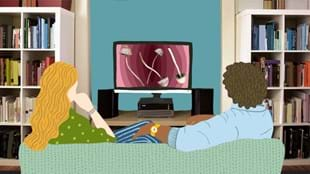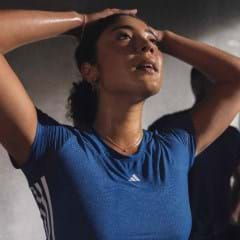“Could you get any Goop-ier?” asks Gwyneth Paltrow at one point in her new Netflix series The Goop Lab. I can’t remember if it was during the ‘energy therapy’ or the psychic medium episode, but I can suggest an answer: No, no you could not.
The fact the series is called a ‘lab’ suggests an element of scientific rigor in the content, and indeed some of the episodes do feature scientists, albeit ones from the far edges of the fringe.
Similarly, there is mention of clinical trials sprinkled throughout, but the show doesn’t enrol participants in these trials. Instead, each episode follows Goop staffers as they embark on experiments with weird and wonderful alternative therapies to address various issues, from grief and trauma to sleeplessness, stress and panic attacks. (For a workplace focused on wellness it was surprising how many of the Goop staff are apparently stressed and anxious.)
Goop-ers journey to Jamaica to take psychedelic mushrooms. They travel to snowy Lake Tahoe to jump into freezing waters with ‘ice man’ Wim Hof. They have the energy fields of their bodies worked on by a chiropractor and bodyworker who hovers his hands above them to release stress. They do a workshop to tap into their inner psychic abilities.
Apart from the psychedelics – where there is a renewed interest in serious scientific study – there seems to be slim to no scientific evidence behind many of these therapies, despite the use of scientific-sounding language.
Each episode cuts between Gwyneth interviewing the featured experts, and the Goop-ers experiencing the therapies. It gives the impression of a protracted infomercial. Indeed, the main benefit of the show may well be to the practitioners who are its heroes who I’m sure will see an upsurge in business. All the episodes tap into the vague ills and issues of modern life – stress, burnout, anxiety, brain fog, overthinking.
A quick survey of the featured therapies reveals most will set you back thousands of dollars.
If you’re keen, though, you’ll be paying a price. As one interviewee puts it, this is definitely the domain of ‘privileged people in LA’. A quick survey of the featured therapies reveals most will set you back thousands of dollars.
Take the episode focusing on nutrition, for example. Gwyneth and co set out to learn how they can stay looking and feeling younger for longer. As well as various pricey cosmetic procedures (including the ‘vampire facial’), three women take on different diets – vegan, Mediterranean, and a ‘fasting mimicking diet’ created by longevity researcher Dr Valter Longo that Gwyneth herself undertakes (a relative steal at just $US245). Given she is already thin, the fact this is designed as a weight-loss diet is mildly alarming to say the least.
While the other dieters eat delicious-looking fresh food, Gwyneth’s is reconstituted from packets supplied by Dr Longo. Although she is shown looking morose, describing how weak and unwell she feels during the five-day fast, she ends by describing her experience “amazing” – maybe because she’s reduced her biological age by several years, at least according to tests conducted by the doctor’s team.
There is some evidence that fasting-style diets can work for weight loss but it would have been great to see an expert other than the guy selling the books and diets speaking to this.
If you only want to sample The Goop Lab, I suggest heading straight for episode 3, ‘The Pleasure is Ours’.
Perhaps seeking to redeem herself from past transgressions when it comes to sexual health (Goop was fined for making misleading claims about vaginal ‘jade eggs’), Gwyneth shines a light – literally, in one memorable scene – on women’s general lack of knowledge about their own genitals and sexual pleasure. It focuses on Betty Dodson, the pioneering 90-year-old sex educator, who begins by reprimanding Paltrow for using the wrong terminology. It’s ‘vulva’, not ‘vagina’, she says, and we need to get to know all about our own.
There’s no potential harm, as far as I can see, in this episode, and it might even prove beneficial for lots of women and men. But overall, this is entertainment and at times it is genuinely entertaining. Just be sure to watch it with your pseudoscience radar tuned to high.
Niki Bezzant is a New Zealand-based food writer, editor and commentator. She is the founding editor (now editor-at-large) of Healthy Food Guide magazine, and is currently president of Food Writers New Zealand and a proud ambassador for the Garden to Table program which helps children learn how to grow, cook and share food. She is a member of the Council of Directors for the True Health Initiative, a global coalition of health professionals dedicated to sharing a science-based message of what we know for sure about lifestyle and health.
Illustration by Anieszka Banks








